American Citizenship -> employment
Employment
Employment refers to the condition in which a person performs work in exchange for payment. It is a crucial aspect of society, as it provides individuals with financial stability and contributes to the overall economy.
Types of Employment
There are various types of employment, including:
- Full-time Employment: Working a standard number of hours per week, typically 35-40 hours, and receiving benefits such as health insurance and paid time off.
- Part-time Employment: Working fewer hours than a full-time employee, often without the same benefits.
- Temporary Employment: Working for a fixed period of time, often to cover for another employee's absence or to complete a specific project.
- Self-Employment: Owning and operating one's own business or freelance work.
Importance of Employment
Employment plays a vital role in society for several reasons:
- It provides individuals with income to support themselves and their families.
- Employment contributes to economic growth and stability by creating goods and providing services.
- It offers opportunities for personal and professional development through skill-building and experience.
- Employment fosters a sense of purpose and fulfillment for individuals as they contribute to society.
Factors Affecting Employment
Several factors influence employment, including:
- Economic Conditions: Economic downturns can lead to job losses, while periods of growth can create employment opportunities.
- Technological Advancements: Automation and technological innovation can impact the types of jobs available and the skills required.
- Education and Training: Access to education and training programs can affect an individual's ability to secure employment.
- Government Policies: Laws and regulations related to labor, trade, and taxation can influence employment trends.
Study Guide
Here are some key points to remember about employment:
- What is employment?
- What are the different types of employment?
- Why is employment important in society?
- What factors can impact employment?
Understanding the concept of employment and its significance in society is essential for comprehending the dynamics of the workforce and the economy.
.◂Social Studies Worksheets and Study Guides Third Grade. American Citizenship
Study Guide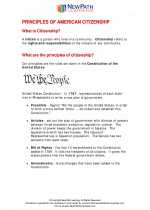 American Citizenship
American Citizenship  Worksheet/Answer key
Worksheet/Answer key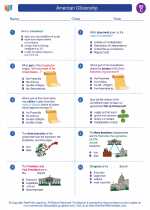 American Citizenship
American Citizenship  Worksheet/Answer key
Worksheet/Answer key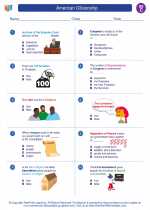 American Citizenship
American Citizenship  Worksheet/Answer key
Worksheet/Answer key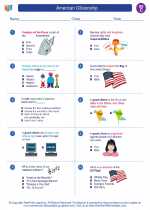 American Citizenship
American Citizenship  Worksheet/Answer key
Worksheet/Answer key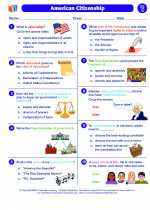 American Citizenship
American Citizenship 

 Worksheet/Answer key
Worksheet/Answer key
 Worksheet/Answer key
Worksheet/Answer key
 Worksheet/Answer key
Worksheet/Answer key
 Worksheet/Answer key
Worksheet/Answer key

The resources above cover the following skills:
National Curriculum Standards for Social Studies (NCSS)
POWER, AUTHORITY, AND GOVERNANCE
SOCIAL STUDIES PROGRAMS SHOULD INCLUDE EXPERIENCES THAT PROVIDE FOR THE STUDY OF HOW PEOPLE CREATE, INTERACT WITH, AND CHANGE STRUCTURES OF POWER, AUTHORITY, AND GOVERNANCE.
KNOWLEDGE - Learners will understand:
Fundamental ideas that are the foundation of American constitutional democracy, including those of the U.S. Constitution, the rule of law, separation of powers, checks and balances, minority rights, and the separation of church and state.
Fundamental values of democracy: the common good, liberty, justice, equality, and individual dignity.
PROCESSES - Learners will be able to:
Examine issues involving the rights and responsibilities of individuals and groups in relation to the broader society.
CIVIC IDEALS AND PRACTICES
SOCIAL STUDIES PROGRAMS SHOULD INCLUDE EXPERIENCES THAT PROVIDE FOR THE STUDY OF THE IDEALS, PRINCIPLES, AND PRACTICES OF CITIZENSHIP IN A DEMOCRATIC REPUBLIC.
KNOWLEDGE - Learners will understand:
The theme of civic ideals and practices helps us know how we can have influence on how people live and act together.
Concepts and ideals such as: individual dignity, fairness, freedom, the common good, rule of law, civic life, rights, and responsibilities.
Key practices in a democratic society include civic participation based on studying community issues, planning, decision-making, voting, and cooperating to promote civic ideals.
Democratic ideals and practices are often represented in excerpts from contemporary and historical sources, quotations, and stories.
The importance of gathering information as the basis for informed civic action.
PROCESSES - Learners will be able to:
Ask and find answers to questions about how to plan for action with others to improve life in the school, community, and beyond.
Identify and exercise the rights and responsibilities of citizens.
Analyze how specific policies or citizen behaviors reflect ideals and practices consistent or inconsistent with democratic ideals.
Examine the influence of citizens and officials on policy decisions.
National Standards for Civics and Government (NSCG)
What is Government and What Should It Do? What are some of the most important things governments do?
Functions of government: Students should be able to explain some of the major things governments do in their school, community, state, and nation. To achieve this standard, students should be able to
Explain how government makes it possible for people working together to accomplish goals they could not achieve alone
What are the Basic Values and Principles of American Democracy? What are the most important values and principles of American democracy?
Fundamental values and principles: Students should be able to explain the importance of the fundamental values and principles of American democracy. To achieve this standard, students should be able to
Identify fundamental values and principles as they are expressed in the Declaration of Independence, Preamble to the United States Constitution, the Bill of Rights, Pledge of Allegiance, speeches, songs, and stories
What are the Basic Values and Principles of American Democracy? What are some important beliefs Americans have about themselves and their government?
Distinctive characteristics of American society: Students should be able to identify some important beliefs commonly held by Americans about themselves and their government. To achieve this standard, students should be able to describe the following beliefs commonly held by Americans:
Importance of their school, community, state, and nation: Students should be able to explain that Americans believe that
People should try to improve the quality of life in their schools, communities, states, and nation
Importance of equality of opportunity and equal protection of the law: Students should be able to explain that Americans believe that
All people have a right to participate in political life by expressing their opinions and trying to persuade others; all citizens over 18 years of age have the right to vote; and citizens who meet age and other qualifications have the right to seek public office
What are the Basic Values and Principles of American Democracy? Why is it important for Americans to share certain values, principles, and beliefs?
American identity: Students should be able to explain the importance of Americans sharing and supporting certain values, principles, and beliefs. To achieve this standard, students should be able to
Explain that Americans are united by the values, principles, and beliefs they share rather than by ethnicity, race, religion, class, language, gender, or national origin
Explain the importance of shared values, principles, and beliefs to the continuation and improvement of American democracy
Identify basic documents that set forth shared values, principles, and beliefs, e.g., Declaration of Independence, United States Constitution and Bill of Rights, Pledge of Allegiance
What are the Basic Values and Principles of American Democracy? How can people work together to promote the values and principles of American democracy?
Promoting ideals: Students should be able to identify ways people can work together to promote the values and principles of American democracy. To achieve this standard, students should be able to
Explain how they can promote the values and principles of American democracy by
Participating in government, e.g., voting, becoming informed about public issues, attempting to change laws by writing to legislators, serving on juries
How Does the Government Established by the Constitution Embody the Purposes, Values, and Principles of American Democracy? What is the United States Constitution and why is it important?
The meaning and importance of the United States Constitution: Students should be able to describe what the United States Constitution is and why it is important. To achieve this standard, students should be able to explain that the United States Constitution
Is a written document that
Describes how the government is organized
Limits the powers of government by saying what government can and cannot do
How Does the Government Established by the Constitution Embody the Purposes, Values, and Principles of American Democracy? What are the major responsibilities of state governments?
Organization and major responsibilities of state governments: Students should be able to explain the most important responsibilities of their state government. To achieve this standard, students should be able to
Explain how people can participate in their state government, e.g., being informed and taking part in discussions of state issues, voting, volunteering their services, holding public office, serving on governing committees and commissions
Explain why it is important that people participate in their state government, e.g., to protect their rights and promote the common welfare, improve the quality of life in their community, to gain personal satisfaction, to prevent officials from abusing their power
How Does the Government Established by the Constitution Embody the Purposes, Values, and Principles of American Democracy? What are the major responsibilities of local governments?
Organization and major responsibilities of local governments: Students should be able to explain the most important responsibilities of their local government. To achieve this standard, students should be able to
Explain how people can participate in their local government, e.g., being informed and taking part in discussions of local issues, voting, volunteering their services, holding public office, serving on governing committees and commissions
Explain why it is important that people participate in their local government, e.g., to protect their rights and promote the common good, improve the quality of life in their community, to gain personal satisfaction, to prevent officials from abusing their power
What are the Roles of the Citizen in American Democracy? What does it mean to be a citizen of the United States?
The meaning of citizenship: Students should be able to explain the meaning of citizenship in the United States. To achieve this standard, students should be able to
Explain the important characteristics of citizenship in the United States. Specifically, citizenship
Means that a person is recognized as a legal member of the nation
Means each person has certain responsibilities, e.g., respecting the law, voting, paying taxes, serving on juries
What are the Roles of the Citizen in American Democracy? How does a person become a citizen?
Becoming a citizen: Students should be able to explain how one becomes a citizen of the United States. To achieve this standard, students should be able to
Explain the difference between a citizen and a non-citizen (alien)
Explain that people become citizens by birth or naturalization
What are the Roles of the Citizen in American Democracy? What are important responsibilities of Americans?
Responsibilities of individuals: Students should be able to explain why certain responsibilities are important to themselves and their family, community, state, and nation. To achieve this standard, students should be able to identify such responsibilities as the following and explain their importance:
Civic responsibilities, e.g., obeying the law, respecting the rights of others, being informed and attentive to the needs of their community, paying attention to how well their elected leaders are doing their jobs, communicating with their representatives in their school, local, state, and national governments, voting, paying taxes, serving on juries, serving in the armed forces
What are the Roles of the Citizen in American Democracy? What dispositions or traits of character are important to the preservation and improvement of American democracy?
Dispositions that enhance citizen effectiveness and promote the healthy functioning of American democracy: Students should be able to explain the importance of certain dispositions to themselves and American democracy. To achieve this standard, students should be able to
Explain the importance of the following dispositions
Individual responsibility—fulfilling one’s responsibilities to family, friends, and others in one’s community and nation
Civic mindedness—concern for the wellbeing of one’s community and nation
What are the Roles of the Citizen in American Democracy? How can Americans participate in their government?
Forms of participation: Students should be able to describe the means by which citizens can influence the decisions and actions of their government. To achieve this standard, students should be able to
Identify ways people can monitor and influence the decisions and actions of their government
Taking an active role in interest groups, political parties, and other organizations that attempt to influence public policy and elections
Explain why it is important for citizens to monitor their local, state and national governments
National Center for History in Schools (NCHS)
Topic 3: The History of the United States: Democratic Principles and Values and the People from Many Cultures Who Contributed to Its Cultural, Economic, and Political Heritage
How democratic values came to be, and how they have been exemplified by people, events, and symbols.
Demonstrate understanding of how the United States government was formed and of the nation's basic democratic principles set forth in the Declaration of Independence and the Constitution.
The student understands events that celebrate and exemplify fundamental values and principles of American democracy.
The student understands national symbols through which American values and principles are expressed.